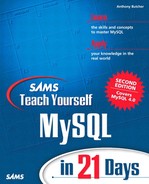A Simple Query Program
Now that you understand how to retrieve a resultset and check whether it was fetched without error, let's update the programs so that you can compile and run them with their new functionality.
The common.c and common.h programs are the same as before, although main.c now has more code, as shown in Listing 13.4.
Listing 13.4. main.c
Lines 36 through 63 should look familiar; they are almost identical to the code example you looked at previously. Notice the function mysql_free_result() in line 45. When you finish processing your resultset, you must use this to free up the memory allocated as a result of functions such as mysql_store_result() or mysql_use_result().
Note
There are also other functions that produce resultsets that we've not covered here.
For example, the API has functions to retrieve information about fields (columns) in a resultset and information about the client, server, and connection protocol. There are also functions to list databases on the server, to show information about processes running on the server, and so on.
Consult the MySQL Web site or the MySQL Technical Reference for more information about other available functions.
mysql_free_result() has the syntax
mysql_free_result (*result)
where *result is a resultset of the datatype MYSQL_RES. It doesn't return a value, and there's no need to check for errors.
You should be able to compile and run this program, although its output still shows only the connection routine and does not display any data from our query. Let's see how to do that.
